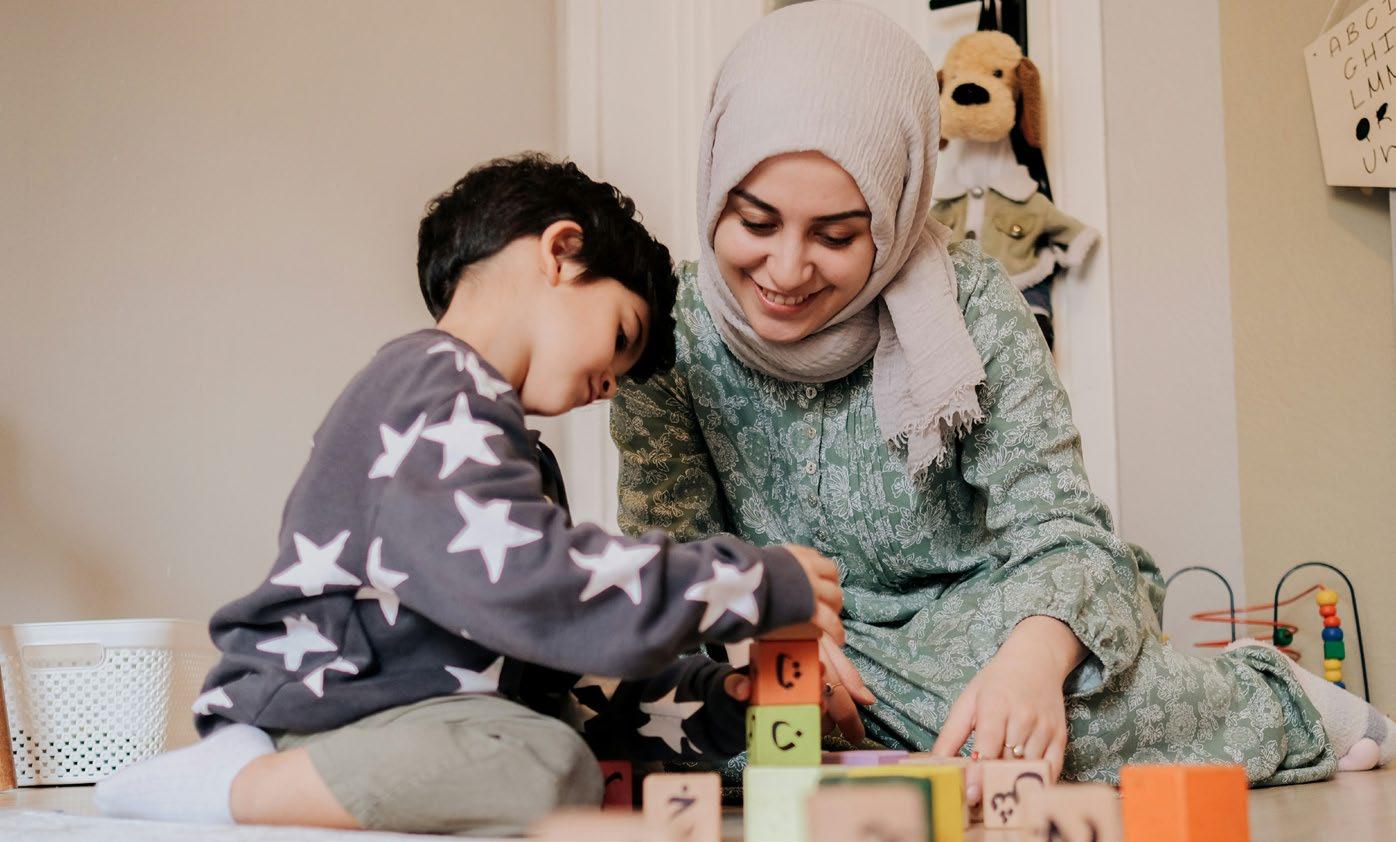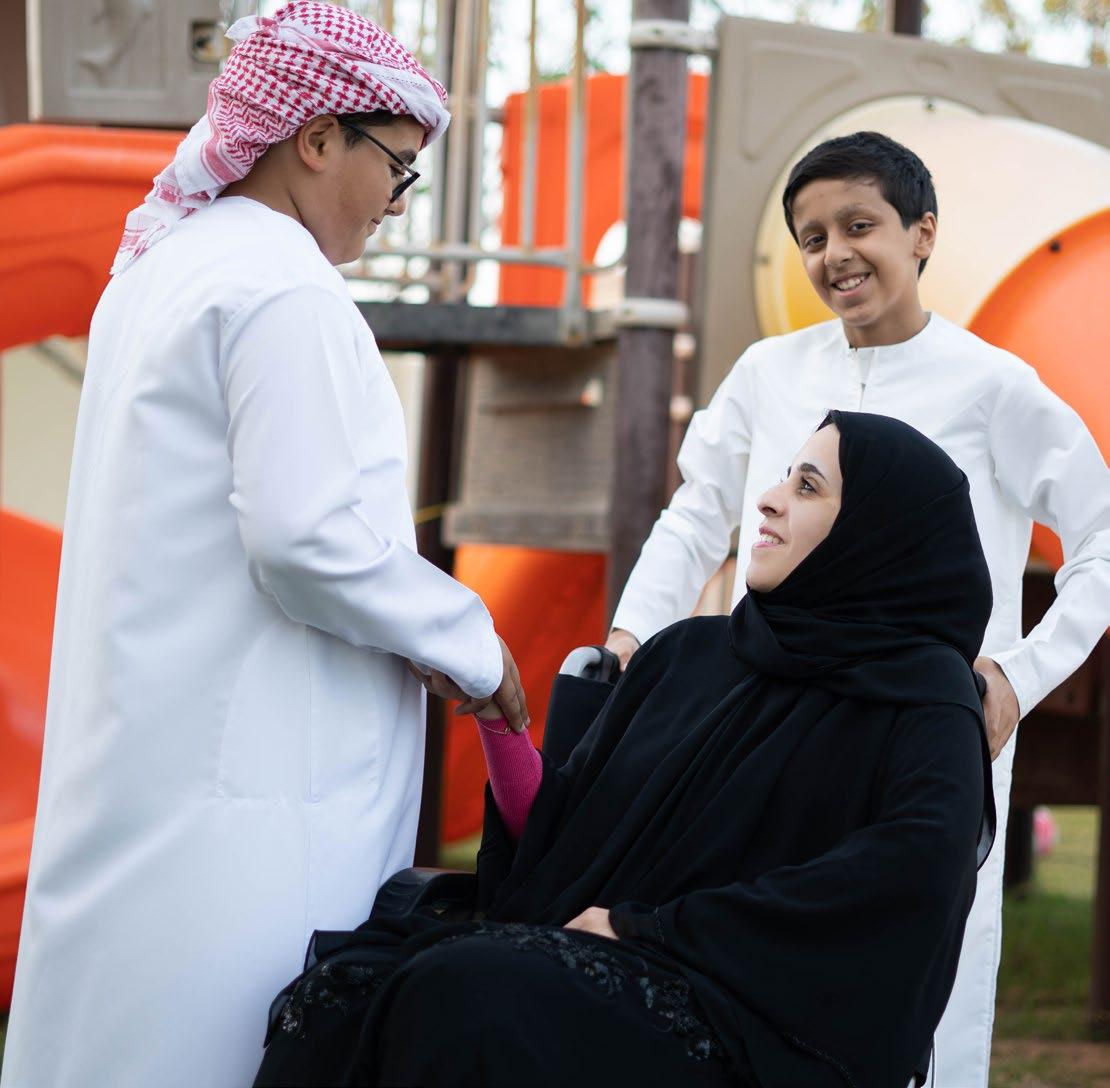WELCOME
Thank you for downloading this Explaining MS to Children Guide, an activity book to help families understand and talk about Multiple Sclerosis (MS).
This guide aims to help families and children understand MS by providing suggestions for how to approach conversations about the condition at home, as well as engaging activities for kids of all ages.
This guide is part of a wider series developed by the National Multiple Sclerosis Society to empower people living with MS and other chronic conditions in the UAE. You can download the whole series by clicking the links below:
Mental Health Handbook & Reflection Journal
Nutrition Guide for MS & Autoimmune Conditions
ABOUT NMSS
The National Multiple Sclerosis Society (NMSS), which operates under the Ministry of Community Empowerment in the UAE, is dedicated to bettering the lives of people with MS and their communities through education, advocacy, and contributing to global research for a cure. NMSS strives to raise awareness of MS, establish a comprehensive support system for the MS community in the UAE, and provide resources to those impacted by the condition.


ENDORSEMENT FROM THE ABU DHABI
EARLY CHILDHOOD AUTHORITY
The Abu Dhabi Early Childhood Authority recognizes the vital importance of supporting parents in navigating challenging health discussions with their children.
This comprehensive guide for parents diagnosed with Multiple Sclerosis (MS) exemplifies the kind of thoughtful, age-appropriate resources that can strengthen family resilience and promote positive child development outcomes. By providing practical, culturally-sensitive approaches for communicating with children of different ages, this manual aligns with our commitment to nurturing healthy parent-child relationships and supporting the emotional well-being of children in our community.
We endorse this valuable resource as it empowers parents to maintain open dialogue with their children while managing the challenges of MS, ultimately fostering understanding, emotional security, and family unity during difficult times.


HOW TO USE THIS GUIDE
Learning that you have Multiple Sclerosis (MS) is challenging, and sharing this news with your children requires careful thought and preparation. This guide will help you navigate these important conversations with sensitivity and age-appropriate honesty.
Please click the links below to access the different sections of this guide.
Important Things to Remember
Dos and Don’ts for all ages
Before the Conversation
Choose the Right Time and Setting
Commonly Asked Questions
The MS Healthcare Team
Select Your Age Level

This guide is meant to be a starting point. Please adapt these suggestions to your family’s unique needs and circumstances.
Remember that professional support is available through MS organizations, family counselors and healthcare providers. Please consult the Moving Forward section of this guide for more information.
Moving Forward
IMPORTANT THINGS TO REMEMBER
Please keep the following important tips in mind when reading through the suggestions contained in this book and navigating conversations about MS with your children.


EVERY CHILD REACTS DIFFERENTLY CONVERSATIONS WILL BE ONGOING
Some children might feel scared, confused or even angry about the news. Others might not seem that affected by the news at first. All of these reactions are normal, and it’s important to let your child know that it’s okay to feel however they feel.


IT’S OKAY TO SAY “I DON’T KNOW”

It is important to keep the conversation open as your child processes the news and has new questions. Check in with them regularly and let them know they can always come to you with any questions they have.

FOCUS ON HOPE AND RESILIENCE
Even grown-ups don’t have all the answers to MS! If your child asks something you’re unsure about, be honest and say you’ll try to find out more.

KEEP LINES OF COMMUNICATION OPEN

Let your child know that people with MS can live full and happy lives. Share stories of people with MS who are doing amazing things to help your child feel hopeful and positive.


Make sure your child knows they can always ask you more questions about your MS diagnosis and what it means going forward.
DOS AND DON’TS FOR ALL AGES
Take a moment to review the following dos and don’ts of talking about MS to children of all ages.
These tips have been recommended by an early childhood development specialist and have been suggested to promote healthy, open family conversation about living with MS.
DOS
Emphasize that MS is not terminal. People live long and happy lives with MS.
Explain to children that it’s not their fault. No one did anything wrong and nobody is to blame for the MS diagnosis.
Reassure them they will be cared for. Tell your child the MS diagnosis will not impact how much they are loved and taken care of.
Maintain regular routines where possible. Try to minimize disruptions to normal routines as far as possible.
Keep communication channels open. Make sure your child knows they can ask questions about anything they might be wondering about.
Share hope and positivity about treatments. Share good news about the impact of treatments and other lifestyle choices (exercise, diet, etc.) on how you are feeling.
DON’TS
Don’t hide your condition. Be open about what is happening to avoid becoming isolated from your family members.
Don’t make promises you can’t keep. Be honest at all times and rather say “I don’t know” than make a promise you can’t keep.
Don’t overwhelm children with medical details. Especially for younger ages, stick to basic explanations and analogies they can understand. Don’t try to explain everything about MS all at once.
Don’t expect immediate understanding. Every child is different, and some kids might take a bit longer to comprehend the news than others. Be patient and go at your child’s pace.
Don’t ignore your child’s emotions. Be attentive to your child’s feelings and check in with them regularly to see how they are doing.
BEFORE THE CONVERSATION
Before sharing the news, it is important that you feel ready to have the conversation about your MS diagnosis with your children.
Consult the following list of tips, taking all the time you need to feel prepared to talk to your children about MS.
Process your own emotions first
Gather accurate, up-to-date information about MS
Children are very perceptive and can pick up on your feelings. If you’re feeling overwhelmed or anxious, it might be helpful to talk to someone you trust first, like a friend, family member or counselor. This will help you approach the conversation with your child in a calm and reassuring way.
It’s important to have a good understanding of MS before talking to your child about it. This will help you answer their questions accurately and confidently. Consult the Resources for parents and children section of this guide for links to further MS resources.
Consider consulting with your healthcare provider or a counselor
Have a basic understanding of how MS might affect your daily life
If you’re unsure about how to talk to your child about MS, or if you’re feeling overwhelmed, don’t hesitate to reach out for support. Your healthcare provider or a counselor can offer guidance and advice on how to navigate this conversation.
Be prepared to explain how MS might affect your daily routines and activities in a way your child can understand. Reassure them that you’ll still be able to spend quality time with them.
CHOOSING THE RIGHT TIME AND SETTING
When you feel emotionally prepared and like you have enough information to talk about MS with your children, it is time to prepare for the actual conversation itself.
Follow these tips to help you choose an appropriate time and setting for the conversation.
SELECT A QUIET, COMFORTABLE, FAMILIAR SPACE

Choose a place where your child feels safe and relaxed to have this conversation. Avoid distractions like the TV or other people coming and going.

CONSIDER HAVING BOTH PARENTS PRESENT (IF POSSIBLE)

ENSURE YOU HAVE UNINTERRUPTED TIME
If possible, it can be helpful for both parents to be present for this conversation. This allows both adults to offer support and answer questions. If this isn’t possible, make sure the other parent is aware of the conversation and available to talk later if needed.
This conversation might take some time, and it’s important to give it your full attention. Make sure you won’t be interrupted by other commitments and let your child know that you have plenty of time to talk and answer their questions.

AVOID EVENTFUL PERIODS (LIKE EXAM TIMES OR HOLIDAYS)
Choose a time when your child is likely to be relaxed, receptive and in a relatively ‘normal’ routine. Avoid bringing up the topic during periods of stress or excitement (like exam times or holidays), when your child might already have many other things on their minds.
COMMONLY ASKED QUESTIONS
This page contains some guidance to address some common questions that children might have about MS.
It is not unusual for children to focus at first on what their parents’ diagnosis might mean for them, and so it is important to reassure kids of all ages about the following points. Please adapt the language and level of your response to suit your child’s age and level of understanding.

“Who will take care of me?”

• Reinforce the message that your child will always be cared for.
• Discuss support systems and family plans to reassure your child that help and care is available.
• Explain how treatments and other things like diet and exercise can help you stay active and energized.

“Will I get MS?”
• Explain that MS is not contagious and is not directly inherited.
• Focus on how your child can stay healthy, such as ensuring they get enough Vitamin D, follow a healthy diet, etc.
• Reassure your child that they will be monitored for any signs of the condition.

“Will you die?”
• Explain that MS is not a condition that makes people die.
• Focus on how people live long, full lives with MS.
• Emphasize the treatments available to manage symptoms and help you feel better.
THE MS HEALTHCARE TEAM
This page provides some pointers for introducing core members of your MS healthcare team. You don’t need to share all of this information with your children all at once, but it can be a helpful way to emphasize the message that treatments are available and that you will be supported in your MS journey by a team of professionals.
Samples of recommended language for different age groups are provided in the table below. Please note that further tips for talking about MS to children in these different age groups are provided in the next section of this guide.
MS TEAM MEMBER
General Physician
AGES 4-7
Mommy/Daddy’s doctor. They will give me check-ups just like usual.
AGES 8-12
Neurologist
Mommy/Daddy’s brain doctor. They will do special checks on me to see what medicines I need.
AGES 13-16
This is my doctor. I will go to them for checkups to see how my body is responding to my MS medicines. My primary doctor. They will be responsible for checking on my overall health and monitoring how I respond to MS treatments.
Some doctors specialize in studying the brain. They will do special checks and scans and figure out what medicines I should be taking to help me feel better.
A doctor who focuses on the nervous system, including the brain and spinal cord. They will prescribe medications and help me manage MS symptoms.
MS Nurse
AGES 4-7
Mommy/Daddy will have their own nurse who knows all about MS and how to help me feel better.
AGES 8-12
Some nurses specialize in different conditions, so Mommy/Daddy will get an MS nurse who knows all about MS and how to help.
AGES 13-16
A registered nurse providing specialized MS care. They will provide guidance on managing symptoms, medications and accessing support networks.
Physiotherapist
Mommy/Daddy’s muscle doctor. They will help Mommy/ Daddy stay strong and healthy.
Occupational Therapist
Mommy/Daddy’s personal coach. They will help me practice doing things around the house.
Some doctors specialize in helping people move. They will check on my muscles and joints and give me exercises to help me stay strong.
Some health specialists focus on helping people do things on their own. They might help me get things done around the house.
A healthcare professional focused on movement and physical function. They will give me exercises to improve my strength, mobility.
A specialist who helps people with daily activities to promote independent living. They might coach me to help me do things on my own.

NOTES
For more information about these different roles, please consult the Resources for Parents and Children section of this guide.
Resources for Parents and Children
Read the following interview with Hamda Albeloushi, an MS ambassador living in the UAE, who shares some tips from her experience of explaining an MS diagnosis to family members.
What tips do you have for explaining MS to children?
What are some effective strategies for building open communication within the family about MS?
It is very important for a child to understand what their parent is going through so that they feel safe. Adults can explain to them that the person with MS might sometimes feel tired or have difficulty moving, just like they do when they get tired after playing for a long time. Let them know that people with Multiple Sclerosis receive support and have medications that help them live a normal, happy life despite the challenges they face. It’s essential to reassure them that this illness is not contagious, that it’s rare for children to get it, and that the person with MS can still live a life full of activity and adventure.
One thing that most patients do not do is inform their family about the MS. Patients should be encouraged to share their condition and the emotions they are experiencing, and to help family members express their support and care. Flexibility in adjusting schedules or activities based on the patient’s condition can enhance their participation without causing exhaustion. Attending workshops or support sessions can help in gaining a better understanding of the illness and the best ways to manage it.
In your opinion, what do parents/ adults misunderstand about the experience of living with MS from a child’s perspective?
Parents may think that children do not feel anxious or that they are too young to understand the situation. Sometimes children feel that they are responsible for the increased fatigue of their parent. A simplified explanation helps them understand that the illness is not dangerous. Sometimes, parents fear involving the child in providing help. Parents should recognize that children need space to express their feelings about the illness.
Do you have any tips for parents to help their children build emotional resilience to cope with the unpredictable nature of MS?
Hamda’s MS related children’s book recommendations:
Talk to them about multiple sclerosis in a way that is appropriate for their age. Encourage them to ask questions to express their fears and concerns, which gives them a sense of security. Discuss your feelings calmly to show them that facing anxiety or frustration is normal and that everyone goes through it. Encourage them to enjoy the good moments, no matter how small. Give them hope in simple ways that even if today is difficult, tomorrow might be better.
• Some Days We… by Julie A. Stamm
• My Mom is Strong by Jen Albertsen
• Why My Mom Is An MS Superhero! by Crystal Holscher
• She’s Not Like Other Moms, But She’s My Mom by Riley Hult

Read the following interview with Rayan Daaboul, an MS ambassador living in the UAE, who shares some tips from her experience of explaining MS to her younger sister.
What tips do you have for explaining MS to children?
What are some effective strategies for building open communication within the family about MS?
Do you have any tips for families to maintain a sense of routine and togetherness while adapting to the challenges of MS?
When explaining MS to children, it is best to use simple words they can understand and to approach the topic gently. Speak in their “language”, using relatable examples to help them grasp the changes, and reassure them as you go.
Encourage honesty and regular check-ins, allowing everyone to share feelings and ask questions. Keep conversations open, approachable and judgment-free, so that family members feel safe discussing the realities of MS together.
Families can establish regular activities, like weekly game nights or shared meals, that everyone can look forward to. It’s important to be flexible and adjust plans as needed, ensuring that everyone feels included and valued. Creating a supportive environment where family members can share their feelings and adapt together helps strengthen bonds and maintain connection during challenging times.
In your opinion, what do parents/ adults misunderstand about the experience of living with MS from a child’s perspective?
They might think kids don’t notice the changes or challenges, but children are more perceptive than we realize. They may struggle with feelings of uncertainty and may need reassurance and clear explanations. Additionally, adults sometimes underestimate how much children want to help or be involved; they need opportunities to express their feelings and ask questions in a supportive environment.

Do you have any tips for parents to help their children build emotional resilience to cope with the unpredictable nature of MS?
Are there any unique challenges of explaining MS to children in the specific context of the UAE?
Start by encouraging open communication. Let them express their feelings and ask questions. Model healthy coping strategies, like talking about your own emotions. Teach them to be flexible with plans and celebrate their small achievements to boost confidence. Establishing routines can also provide a sense of stability. These steps can help your child navigate the challenges of MS while feeling supported and resilient.
Explaining MS to children in the UAE can be challenging, especially with the tough summer heat that limits our activities. For example, my 9-year-old sister and I used to have regular beach dates to bond, but as the heat intensified, we had to cut back on those outings. It was hard for her to understand why our special time together had to change, making it important for me to find gentle ways to explain my limitations while reassuring her that our bond is still strong.

SELECT YOUR AGE LEVEL
To access conversation tips and a range of activities designed to help you explain and talk about MS with your children, simply click the link below to access the age level you are looking for.
AGES 4-7
AGES 8-12
AGES 13-16

AGES 4-7

young children (ages 4-7) understand more about MS.
Before accessing the activities for ages 4-7, read the following key tips for discussing MS with this age group.
Keep explanations simple and concrete
Use basic analogies
Young children understand the world through concrete experiences. When explaining MS to this age group, use simple words and avoid complex medical terms.
Try to relate the things you say about MS to things your child already understands. For example, “Sometimes Mommy’s/ Daddy’s body gets extra tired, like when you run around a lot at the playground.”

Focus on visible symptoms they might notice
Reassure them that MS is not contagious
Emphasize that they didn’t cause it
Young children are most likely to notice visible symptoms, like fatigue or walking difficulties. Explain these symptoms in simple terms and don’t go into more detail than is required.
Young children often worry about “catching” MS. Explain that MS is not like a cold or the flu; it’s not something you can catch from someone else and it’s nobody’s fault that they have MS.
Always reassure your child that they didn’t do anything to cause the MS diagnosis and that it’s nobody’s fault.


This page includes some sample dialogue and recommended language for this age level. Please adapt to suit the communication style and level of understanding of your child.

“Mommy/Daddy has something called MS. It makes my body feel tired sometimes, like when you run around a lot at the playground. Sometimes my legs might not work as well as usual, but the doctors are helping me.”

“Mommy/Daddy is feeling tired today, like my battery isn’t fully charged. I might need to rest a little more today to recharge my battery.”

“Mommy/ Daddy might need to go a little slower today. It feels like I didn’t get a great night’s sleep, so I may need a little more time today to do my normal things.”

“Mommy/ Daddy is feeling a little bit sick today. It’s like the weather, some days turn out to be hotter or cooler than we expect them to be.”
Click on the buttons below to access some activities to complete with your child to understand more about MS and its basic symptoms.
Who’s Who?
Word Search Word Scramble
Feelings Pie
MS Rollercoaster Board Game
A drawing activity to help introduce your child to your healthcare team.
A word game to help you explain physical symptoms of MS to your child.
A word game to help you explain some emotions of living MS to your child.
A coloring activity that encourages children to talk about their emotions.
A printable board game that encourages safe, open conversation about the ups and downs of living with MS.

A drawing activity to introduce kids to the MS healthcare team.
NOTE FOR PARENTS
This drawing activity provides a chance to introduce your child to core members of your MS healthcare team in a fun and playful way. You can print this page or make your own gallery at home using a blank piece of paper. Explain these roles to your child and let them know how your healthcare team is helping you.

LET’S DRAW!

Someone told us you love drawing!
Show us your skills by filling out the MS Who’s Who?

ME!
MOMMY/DADDY


MS NURSE
PHYSIOTHERAPIST (MUSCLE DOCTOR)


NEUROLOGIST (BRAIN DOCTOR)

Many of the signs and symptoms of MS are not evident to children, so it is difficult for them to understand what the person with MS is experiencing. Help your child understand by relating the symptoms to something they already understand or have personally experienced.
NOTE FOR PARENTS
We recommend doing this word search activity alongside your child. Provide help with the visual activity (if needed) and be on hand to discuss the symptoms contained in the Word Search.

Can you find all these words in the word search to learn more about how MS can make you feel?
Tiredness Weakness Balance Pain Numbness Vision Dizziness Fuzziness

d r i m u n w s n f
a i e g u m s t u u
r n z n c e e o m z a s i z n p v w b z o a r k i x e d n i p n a m l n s g e n
r e o i a k e l s e
w v m y n e l s s s
s v i s i o n u s s
b a l a n c e a b t
t i r e d n e s s r

Living with MS can have ups and downs along the way. Sometimes, we may not be aware of how transparent our feelings and emotions are to our children. It is important to let them know it is okay to have ups and downs.
We recommend doing this word scramble activity alongside your child. Provide help with the visual activity (if needed) and be on hand to discuss the emotions listed below. Help your child build their emotional vocabulary by relating the emotions contained in the Word Scramble. to feelings they already understand or have personally experienced.


Can you unscramble the words in the boxes below to spell out some different emotions your family might be feeling?
OINTURSFRAT
REFA
EOHP
EVOL
YAENXIT
RAGNE



































EUGTRADTI









DESSNAS







FIND THE WORD:








FEELINGS PIE NOTE FOR PARENTS
Sometimes, when big things happen, we feel lots of different things inside. This coloring activity is designed to help children understand what they are feeling and talk about their emotions.
We recommend doing this coloring activity alongside your child. The aim of the activity is to provide an accessible way for young children to talk about their feelings. You can print the following page to use as a template or else make your own at home using a blank piece of paper and something to trace the shape of a circle.

Let’s make a feelings pie to help us understand all our different feelings!
STEP 1
Each pie section will be for a different feeling. Do you feel happy, excited, sad or confused? Think of all the different things you’ve felt in the last week and label each slice with a feeling.
STEP 2
Now find a color to match the feeling. Just like feelings, some colors are happy, some are sad, others are angry, confused, scared or hopeful. Can you use your colors to make a feelings pie?

MS ROLLER COASTER BOARD GAME
Living with MS can feel like riding a roller coaster at times, with ups and downs along the way. But even though roller coasters can be scary, they can also be fun! Who wants to play a family game?
Print the MS roller coaster game on the next page, grab a set of dice - and let’s see who can reach the end of the board first!
YELLOW ARROWS
What are the things that are bringing you support and comfort?
BLUE ARROWS
What are the main challenges you are facing as a family?
NOTE FOR PARENTS
This family activity is designed to provide a safe, relaxed way to talk about MS symptoms and the kinds of things the family can do to support the person living with MS. Print the board game provided on the next page. Before you start to play, take a moment as a family to discuss the main challenges (blue arrows) you are facing and the things that are currently bringing you support and comfort (yellow arrows).


AGES 8-12

Tips, suggestions and activities to help children (ages 8-12) understand more about MS.
RECOMMENDED LANGUAGE
This page includes some sample dialogue and recommended language for this age level. Please adapt to suit the communication style and level of understanding of your child.

“MS is when the body’s immune system, which usually fights germs, gets confused and affects the way messages travel through the body. This can make me feel tired or weak sometimes, but medicines can help manage these symptoms.”

“MS is a condition caused by damage to the protective covering of nerves inside the body, called myelin. This makes it harder for the brain to send messages to the rest of the body. It’s a bit like when the internet is slow and the video keeps buffering.”

“Nobody did anything to cause Mommy/Daddy’s MS diagnosis. Doctors are still trying to understand the condition, but there are things we can do to stay healthy until they figure it out.”

“MS is different for everybody. This is because the brain sends messages to every part of your body and the nerve signals can be confused in different places.”
CHOOSE YOUR ACTIVITY
Click on the buttons below to access activities designed to help your child understand more about MS and its symptoms.
Spot the Difference!
What’s Happening?
Attack of the White Blood Cells!
A visual puzzle that introduces the concept of myelin to children.
A simplified map of the human body that encourages some basic research about MS symptoms.
A drawing activity to explain what happens in the body when someone has MS.
What Would You Do?
MS Storytime
My MS Aid
A role-play activity using ‘scenario cards’ to help children practice talking about MS.
An activity that encourages children to write their own story about MS.
Have a conversation about MS symptoms and collaborate as a family to create your own MS aid.

Did you know that messages travel from your brain and around your body like electricity?
Your brain sends messages to all the different parts of your body through the spinal cord, letting them know what to do and what to feel. This partnership is called the central nervous system.

NOTE FOR PARENTS
This is a basic activity designed to introduce your children to the concept of myelin and the causes of MS. Be on hand to provide assistance with the visual activity on the following page (if required) and to help explain the link between myelin damage and MS symptoms.
Can you spot 5 small differences between the two pictures below?


WHAT’S HAPPENING?
Do you want to know more about what’s happening inside the body when someone has MS?
Answer the questions to learn about the relationship between the nervous system, the brain and multiple sclerosis.
NOTE FOR PARENTS
This activity is an opportunity for your child to learn more about the basics of MS. It can be completed on their own (doing their own research to answer the questions) or in your company. An answer key is provided on the next spread of pages if you want to turn this activity into an at-home quiz!

Have you answered all the questions?
Check the Answer Key in the last section of this guide and give yourself a score!
QUESTIONS:
What does MS stand for, and what does it mean?
What is the name of the protective coating around our nerves that gets damaged in MS?
True or False: Everyone with MS experiences the exact same symptoms.
Why is MS called an autoimmune condition?
If the myelin is damaged in the optic nerve, what issues might a person with MS experience?
Why might someone with MS have trouble with things like holding a pencil or buttoning their clothes?
Check your answers to the activities on page 90!







ATTACK OF THE WHITE BLOOD CELLS!
We need your help to finish this comic strip about what happens inside the body when someone has MS. You might already know about how white blood cells get confused and attack the body’s myelin - now it’s your turn to show what happens next! The first panel of the comic has been drawn for you. You can copy these shapes or draw your own to finish the story!
NOTE FOR PARENTS
This drawing activity is meant to be completed with guidance to explain the different scenes of the cartoon. The goal of this activity is to provide a simplified explanation of what happens inside the body when someone has MS. Note that it might be more suitable for older children in this age group. Print this spread, or else use a blank piece of paper at home and follow the captions to complete the cartoon.



In a healthy brain, the blood-brain barrier keeps the brain safe. White blood cells patrol the bloodstream, fighting off germs and keeping things healthy.


But in Multiple Sclerosis (MS), something goes wrong. The blood-brain barrier gets leaky, and the white blood cells get confused!


The confused white blood cells think the brain’s myelin is an enemy. They start to attack it!
5 4 6


But medicines can help! Medicines stop the white blood cells from attacking and keep them from entering the blood-brain


The damage to the myelin causes issues with how the brain and body communicate. This can lead to many different MS symptoms.


With the right treatment and support, people with MS can live full and happy lives!
WHAT WOULD YOU DO?
What would you do? Look at the following situations and decide how you would respond if it happened to you. Think about your answers and then discuss them with your family!
NOTE FOR PARENTS
We recommend completing this activity as a family. It is designed to allow your kids to practice talking about MS in a safe and fun way. Turn this activity into a game by printing this spread of pages and cutting out the different scenario cards. Shuffle these around and draw the cards at random. Take turns, each drawing a different scenario and acting out your response.





YOU HEAR SOMEONE AT SCHOOL MAKING A JOKE ABOUT PEOPLE IN WHEELCHAIRS.
YOUR FAMILY MEMBER IS HAVING A BAD DAY WITH THEIR MS AND IS FEELING FRUSTRATED OR SAD.
How do you use this opportunity to educate them about conditions like MS and the importance of being sensitive?

You’re at school, and you feel your own mood being affected. How do you manage your emotions and explain the situation to your teacher if needed?
Imagine a world where anything is possible! Someone you love has MS, but in this story, you have the power to create your own adventure. Let your imagination run wild as you explore a world where anything is possible.
NOTE FOR PARENTS
This activity is designed for your child to complete on their own, but you are welcome to help out. You can support by talking to them about their ideas for their story and by reading their masterpiece when it is complete! Ask questions about the characters and the events of the story. Encourage your child to illustrate the story using a blank piece of paper.
STUCK FOR IDEAS?
Struggling to know what to write about? Look at the list below for some ideas to get you started!
During a school trip you discover a brand-new species of plant. Researchers discover it contains Vitamin X, a breakthrough substance that can repair myelin!
With the help of a famous scientist, you develop a high-tech suit that senses the wearer’s MS symptoms in real-time and adjusts to provide the support they need!
One day, the world slips into a parallel dimension where people with MS are suddenly healthy and everyone else starts experiencing MS symptoms. What happens next?

You can write your story here, or else use a piece of paper at home!

Have a conversation with your parents and loved ones about how MS is making things different in the family. Then, engage your creativity by creating a helpful MS aid!
Some ideas are provided below, but remember to create something that you want to do and will benefit the person in your life that is living with MS.
Here are some ideas for DIY MS aids for you to create!
Button helper
Attach a large loop of yarn or ribbon to buttons to make them easier to fasten and unfasten.
Kitchen utensils
Customize utensils by using clay or modeling dough to add weight and make it easier to grip.
Water bottle holder
Create a device to hold a water bottle within easy reach.
Non-slip socks
Decorate plain socks with puffy paint or fabric glue to create non-slip grips for better traction on slippery floors.
Cushion cover
Decorate a simple cushion cover to add comfort and support to a favorite chair or sofa.

What will you create?
What do you want to make? How will you do it? Who will help you? Write your ideas in the box below!

My
game plan
How will you create your MS aid? Use the box below to write a list of the materials you will need and the steps you will take.

NOTE FOR PARENTS
This craft-based activity can be completed as a family. It encourages gentle conversation about MS symptoms by framing the question in terms of how the person with MS could use support on a daily basis. You can assist with this craft activity by helping your child find instructions for how to build these simple MS aids online.
Read the following interview with Muna Al Harbi, who shares some tips about how to promote emotional resilience in the context of living with MS. What tips do you have for explaining MS to children?
When explaining MS to children, it helps to be open but gentle, matching the level of detail to their age. You might start by saying, “Mom has something called MS, which means my body doesn’t always work the way I want it to.” Using simple analogies, like explaining that your body’s “wires” are not working perfectly, can help them grasp the idea. Encourage questions, and remind them that it’s okay to feel confused or worried. Most importantly, let them know that, while MS can be unpredictable, there will always be love, safety and support for them.
Do you have any tips for parents to help their children build emotional resilience to cope with the unpredictable nature of MS?
Helping children build resilience starts with validating their feelings. Let them know it’s normal to feel frustrated, worried, or even angry about MS. Encourage them to talk openly, and teach them simple coping strategies, like deep breathing or journaling. Emphasize the importance of flexibility, and model it yourself. Show them that, even on tough days, there’s always something to be grateful for. Reinforce the idea that MS may change plans, but it doesn’t change your love, and you’re all strong enough to face it together. Emphasize the idea that while we can’t control everything, we can always find ways to adapt. This mindset can empower children, helping them see changes as challenges they’re capable of handling. Celebrating small victories — whether it’s finding a new routine that works or making the best of a “low-energy” day — can show them that adaptability is a strength.

In your opinion, what do parents/ adults misunderstand about the experience of living with MS from a child’s perspective?
Are there any unique challenges of explaining MS to children in the specific context of the UAE?
As parents, we sometimes underestimate just how perceptive our children are. They can often sense when we’re in pain or stressed, even if they don’t fully understand the reason behind it. They might feel worried or confused but not know how to express those feelings. It’s natural to think that talking less about MS will protect them, but avoiding the subject can actually lead to more confusion and worry. Simple, honest communication can ease their concerns, helping them understand that while MS is part of our lives, it doesn’t change our love for them or the stability we provide.
In our culture, where extended family is close-knit and frequent gatherings are common, there’s a chance that a relative might mention MS to them in a way that could be frightening or overwhelming. This can sometimes make children hesitant to share their feelings, as they may not want to add to their parent’s burden. I find it’s better for me, as a mother with MS, to explain it to them myself—early on and in a way that grows with them. My version of the story becomes something they can trust, keeping them informed without the negative impact of hearing it from someone else, helping them feel secure as they grow.
Read the following interview with Abdalla Al Mansoori, who shares some insights about how the supportive role that spouses can play in navigating the challenges of living with MS.
What are some family and couple strategies you’ve found to maintain good communication and positivity even in challenging situations?
One of the most helpful strategies has been establishing a strong foundation of open, honest communication. We make it a priority to check in with each other regularly, asking how we’re really doing, not just on the surface. If something’s particularly tough for her, I try to listen without jumping in to fix things right away, which can sometimes be our first instinct. We also maintain positivity by celebrating the little wins—whether it’s a good day, a milestone achieved, or simply a quiet evening together. Focusing on these moments brings us closer and reminds us to be grateful for each other, no matter the challenges.
What things have you done as a family to adapt to living with the condition, such as creating/ tweaking family routines and rituals, altering diet, finding ways to provide support and encouragement, etc.?
As a family, we’ve made adjustments that keep her well-being in mind but allow us to enjoy time together. We’ve become more flexible with our routines, recognizing that some days may require a slower pace or a change in plans. We try to maintain a balanced diet, incorporating foods that support her energy and overall health. Regular, gentle exercise as a family, like walking or yoga, has also become a way to stay connected and active. On a personal level, I’ve taken on certain household tasks when needed, helping to lighten her load. We also make time for shared family activities that don’t require a lot of physical exertion, like movie nights or board games, so she can relax and still be part of the fun. These adjustments have not only helped us support her but have brought us closer together as a family. MS has been a blessing for our family, strengthening our bond and making us understand one another on a different level.
What have been some important resources for you (information sources, support services, etc.) to learn more about MS and how to support your partner?
Over the years, I’ve relied on reputable MS organizations and online communities for information. Websites like the National Multiple Sclerosis Society of UAE provided essential information about the condition, treatment options, and coping strategies. Attending support group meetings along with people with MS has also been invaluable. Beyond formal resources, talking to her neurologist and other healthcare providers gave me practical advice on how to be supportive. Finally, I learned a lot just from watching Muna—the strength and resilience she’s shown has taught me more than any resource ever could.
As a spouse, do you have any tips for how to support the person with MS and open communication lines within the family following the initial diagnosis?
Following Muna’s diagnosis, my main focus was to be present and patient. I think it’s crucial to allow your partner to express what they need without assuming or trying to guess. Early on, I simply asked, “How can I support you?” and let her guide me. Establishing a routine where we share updates, talk about upcoming doctor appointments, or discuss any concerns helps keep us both in the loop. I also think it’s essential to foster open communication within the whole family, not just between the two of us. We created an environment where our kids felt comfortable asking questions and expressing their feelings, which made everyone feel more connected and less anxious.

In this very special interview, three Emirati children - Hamdan (13 years), Khalfan (12 years) and Mouza (10 years) - talk about their experience of living with MS in the family.
What do you remember about the day Mommy received her MS diagnosis?
Mouza: I actually don’t know because when she was diagnosed I was just born.
Khalfan: I was young about 2-3 years old and I didn’t know nor notice my lovely mother had MS and when I got older and bigger the symtoms when I was about 7 years old and from that time I started to help my mother in every thing she struggles.
Hamdan: I don’t really remember anything, but I remember you talking to me about it, it was a bit surprising actually, but if i think of anything, I think it strengthened our bond
What helped you understand about MS and what it means?
Mouza: My mom tell me that MS is a disease and she tell maybe she can’t walk, balance, but one thing I obviously knew she was always tired.
Khalfan: I learned what MS means by the way my mother explained it to me when she struggled through and she still provided for the family and kept up with the MS.
Hamdan: My mom helped me understand almost everything said everything about it in detail but simple, though I had to google some of the lesser known stuff.


When it comes to MS, what are you curious about? What would you like to know more about?
What are some of your favorite things to do as a family at the moment? What do you, Mommy and Daddy do to spend quality time together?
Mouza: The things I want to learn are what could happen to her in the future with MS.
Khalfan: I am still curious about what MS still does. When I found out I was so curious about MS I was like a baby who was trying to learn how to walk it was hard thinking about cause I do care about my mother a lot and I mean A LOT.
Hamdan: I know most, if not all stuff about it, if not I at least know all of the basic’s.
Mouza: I like to talk with them go out with them I like to go to MS events with my mom like its fun for me.
Khalfan: When we spend quality time together its like were on a vacation to an island we go to malls and vacations and my most farvorite place we flew to was Bangkok it was a great vacation.
Hamdan: I love hanging out in general, and we mostly hang out in malls laying back and chilling.

AGES 13-16

Tips, suggestions and activities to help teenagers (ages 13-16) understand more about MS.
RECOMMENDED LANGUAGE
This page includes some sample dialogue and recommended language for this age level. Please adapt to suit the needs and communication style of your child.

“MS is an autoimmune condition, which means my immune system - which usually attacks germs - mistakenly damages the myelin sheath that protects my nerves. This disrupts the nerve signals, kind of like when a wire gets frayed and the electrical signal is interrupted. This can cause a variety of symptoms, like fatigue, muscle weakness or issues with my vision. But there are medications and therapies that can help manage these symptoms and slow the progression of the condition.”

“With MS, everyone’s experience is unique. This is because myelin damage can occur in different areas of the brain and spinal cord, affecting different functions. Some people might experience mild symptoms, while others might have more serious symptoms. But there’s a whole community of people with MS, and we can learn from and support each other.”

“Imagine the myelin sheath as the insulation around an electrical wire. In MS, this insulation gets damaged, causing the electrical signals to slow down or get lost. This can affect different parts of the body, it all depends on where the myelin has been damaged. But there are ways to manage these symptoms and maintain a good quality of life.”
CHOOSE YOUR ACTIVITY
Click on the buttons below to access some different activities designed for teenagers to understand more about MS and reflect on their feelings.
My MS Teaching Aid
Big Questions
MS Mini-Documentary Challenge
An activity that encourages teens to create a teaching aid to help others understand MS or its symptoms.
A space for teenagers to journal about their feelings, concerns and questions.
An activity that challenges teenagers to make a minidocumentary about living with MS.

One of the hardest things about MS is that many people don’t understand the condition. What can you do about it?
We challenge you to create a teaching aid to help explain MS and its impact to others. This can be a physical prop or digital asset that focuses on the causes or symptoms of MS.
NOTE FOR PARENTS
This activity can be completed as a family (along with some independent work from your teenager). It provides a good opportunity to discuss MS from an educational point of view, encouraging teens to apply their understanding of the condition to help others learn more about MS.
Here are some ideas for teaching aids for you to create!
• A hands-on model that teaches people about neurons and myelin sheaths
• A board game or quiz game where players learn about MS symptoms along the way
• A digital map of the human body that allows people to explore different MS symptoms

WHAT WILL YOU CREATE?
Write your ideas in the box below!


My game plan
How will you create your MS teaching aid? Use the box below to write a list of the materials you will need and the steps you will take.


BIG QUESTIONS
News of an MS diagnosis in the family can stir up a whirlwind of emotions, and these can be harder to deal with if you are keeping them all inside.
This activity is designed to give you a safe space to explore the big questions and the feelings that might be swirling around inside. It includes a space for you to write down ideas about who to talk to if you are feeling overwhelmed.
NOTE FOR PARENTS
This activity is designed for your teenager to complete on their own. It is meant to provide a safe and private space for them to process their feelings and the big questions that are on their minds. You can support by reminding them that they can always come to you with any questions they might have about MS and its impact on the family.

What are you feeling?
Check in with yourself. What emotions have you been experiencing recently? Try to identify the specific emotions and write them down. It’s okay to have mixed feelings or not even fully understand what you’re feeling. Remember that this activity is for your eyes only, so use this space to express yourself freely.

What are the big questions you want to ask?
What questions do you want to ask to help you make sense of your feelings? Write down any questions you have about the condition itself, its impact on your family or your own future. Don’t hold back, even if the questions seem scary or difficult. This is your safe space to express your concerns.

Who can you talk to about these questions?
Think about the people in your life who you trust and feel comfortable talking to. Make a list of those individuals, whether it’s your parents, siblings, friends or teachers. Can any of these people help you with some of the Big Questions you thought of? Do you need to find someone to talk to? Make notes in this box and speak to your parents if you feel you need some extra support.

What do you wish the rest of the world understood about living with MS?
Based on your experiences or the research that you’ve done, can you create a mini-documentary that raises awareness about living with MS? This could focus on the physical, medical, emotional or practical aspects of living with MS.
Note for parents: This activity is designed for your teenager to complete on their own. You can support by answering their questions and agreeing to participate in the making of the documentary (if you wish).
What message do you want the rest of the world to hear about MS? Make notes in the box.


Paste the link to your mini-documentary here! Show your family what you made!



NOTES
DO NOT post your documentary on any public social media platform without discussing it with your family. Ensure they feel comfortable about sharing your project before you show it to anyone else.
Read the following interview with Deborah Dunne, an MS ambassador and school teacher living in the UAE, who shares some tips from her experience of explaining MS to children. What tips do you have for explaining MS to children?
Simplify the vocabulary and use age-appropriate terms. Using analogies to compare MS to something they understand can be helpful, like how their iPad can have problems connecting to the WiFi, or how a gap in an electrical circuit can disrupt the connection. Diagrams to aid understanding are often helpful. Encourage questions and let them know it is okay to ask questions and express their feelings. Tell them that no question is a silly question because adults are only becoming aware of this condition now, too!
What are some effective strategies for building open communication within the family about MS?
Do you have any tips for families to maintain a sense of routine and togetherness while adapting to the challenges of MS?
Have regular check-ins and set aside time to talk as a family about feelings and experiences related to MS. Explain how sometimes you may have symptoms like fatigue, and this is because your body is passing messages through a damaged nervous system, which takes up a lot of energy. Being honest is key and to share your feelings and experiences openly. It helps create a safe space for others to share. Using visual aids like charts or drawings can help illustrate concepts related to MS, making discussions easier.
Designate regular family game nights or outings to the mall, adapting these activities as needed. The morning time usually works best for me and my MS, so I like to walk my pups at this time and go for breakfast with my husband. Routines are important; however, be clear that plans may change to accommodate fatigue or low energy levels.

Do you have any tips for parents to help their children build emotional resilience to cope with the unpredictable nature of MS?
Are there any unique challenges of explaining MS to children in the specific context of the UAE?
It’s important to encourage children to express their feelings and let them know that it is okay to be upset or confused. Communication is key. Involve children in finding solutions to challenges, fostering a sense of agency and resilience as you create coping strategies as a family. I also recommend teaching children relaxation techniques or mindfulness practices to help them manage stress.
I feel that MS awareness has increased over the last few years due to the hard work of the National Multiple Sclerosis Society. However, there still seems to be some cultural sensitivity to the condition. Families may feel uncomfortable discussing MS openly, which can make it harder for children to understand the condition. Due to MS awareness increasing here in the UAE, misconceptions of the condition can be altered, among both children and adults; however, there may be stigma associated with chronic illnesses which can impact the children’s ability to express their feelings and ask questions. Finally, schools may not be equipped to handle conversations about MS, which can leave children feeling isolated if they cannot discuss their experiences with a teacher or teaching staff.

MOVING FORWARD
Living with MS will have its ups and downs, and the conversation about MS will be ongoing within the family.
This is simply part of the process of creating a ‘new normal’ within the family that makes space for the unpredictable nature of the condition.
SIGNS THAT YOUR CHILD MIGHT NEED EXTRA SUPPORT
Every child will have their own, individual reaction to the news of an MS diagnosis in the family. This reaction may not always follow a straight, predictable path, and so it is important to look out for signs that your child could use some extra support in the MS journey.
Be attentive to your child’s mood and behavior and watch for the following signs.
Changes in behavior or mood
Your child might become more withdrawn, irritable, or anxious. They may have trouble concentrating or experience mood swings.
Social withdrawal
Your child might start spending less time with friends or engaging in social activities. They may seem isolated or prefer to be alone.
Sleep issues
Your child might have trouble falling asleep or staying asleep. These sleep disturbances could be a sign that they’re feeling worried or anxious.
Declining school performance
Your child’s grades might drop, or they might lose interest in school activities. See our tips for speaking to school counselors on the next page.
Physical complaints
Your child might complain of headaches, stomach aches, or other physical symptoms. These complaints could be a way of expressing how they’re feeling on the inside.

Navigating MS and explaining the condition to your children can be emotionally challenging. If you or your child need additional help, do not hesitate to seek professional guidance. A psychologist specializing in child psychology or chronic illness can provide valuable support by helping children understand and cope with the emotional and social challenges associated with an MS diagnosis in the family, while also offering guidance to parents on how to best support their children. The NMSS directory provides information about healthcare professionals in your area. Consult this resource to find the care you need.
Link to NMSS directory
News of a medical diagnosis in the family can sometimes affect a child’s performance at school.
Emotional stress and routine changes can make it difficult for children to concentrate, lower their motivation and change their behavior at school. In these cases, communicating with your child’s school counselor can help in creating a supportive learning environment for your child.
KEY TIPS
Keep the following tips in mind when speaking to your child’s school counselor.
DISCUSS CONCERNS

Talk about specific concerns you have about your child’s academic, social or emotional well-being. You don’t have to disclose your private medical information, but try to give some context by sharing your recent observations of your child’s mood or behavior.
REGULAR UPDATES
COLLABORATIVE APPROACH

Work together with the counselor to discuss options and develop a plan to help your child get back on track. This could include some extra homework activities to support your child outside of the classroom or finding ways to promote socialization at school.

Be proactive about getting feedback on your child’s performance, mood and behavior at school from their counselor. Children spend a large portion of each day at school, and so these professionals are well placed to provide feedback on how they are managing on a dayto-day basis.

NOTES FROM A SCHOOL COUNSELOR
Read the following interview with Dara Davey, a school counselor at Safa British School in Dubai, who shares some insight into the role that counselors can play in supporting children who are coping with an MS diagnosis in the family.
How can school counselors support children who are battling with the news of an MS diagnosis in the family?
What tips do you have for explaining chronic conditions like MS to children?
Our school counselors provide a safe space where children can openly express their emotions, helping them process any fears or anxieties around a loved one’s MS diagnosis. Through tailored support sessions, we offer coping tools and resiliencebuilding exercises that are sensitive to each child’s individual needs. We also work closely with families to ensure consistency and support both at school and home. It may be the counselor or pastoral lead depending on the children’s relationships.
We recommend that parents approach this topic in ageappropriate ways, using simple, clear language and focusing on reassurance. At Safa British School, we advise using analogies that children can understand, like comparing MS to moments when our bodies need extra rest. We remind parents to be honest while emphasizing the steps being taken to support the loved one’s health. As always for our younger children, visual prompts can really support their understanding.
In your opinion, what do parents and adults misunderstand about the experience of living with MS from a child’s perspective?

Often, adults may underestimate the questions and fears children may have or may focus only on the medical aspects of MS. Children tend to be highly sensitive to the emotional atmosphere around them, so we encourage parents to understand that children may worry about how MS will impact family life and routines. Our school counselors are here to bridge this gap by helping families understand and validate the child’s experience. Open honest conversations are important.
Do you have any tips for building open communication within the family about MS?
Do you have any tips for parents to help their children build emotional resilience to cope with the unpredictable nature of MS?
Creating a consistent, open dialogue is key. We suggest parents check in regularly with their children, encouraging them to ask questions or share feelings without pressure. Safa British School offers family workshops and resources to guide these conversations, helping everyone feel empowered to express themselves and discuss changes openly. Sometimes, having a “family talk time” set aside each week can be a reassuring way to maintain connection.
Encouraging healthy routines and activities that bring a sense of control and joy can be extremely helpful. We focus on resilience-building activities like mindfulness, journaling and creative outlets that help children process emotions in constructive ways. Additionally, our counselors can provide strategies for parents on fostering adaptability, reinforcing the message that while certain aspects of life with MS are unpredictable, the family’s love and support are constants that the child can always rely on.
RESOURCES FOR PARENTS AND CHILDREN
Please consult the following helpful resources for further support as you navigate the MS journey with your family.
IMPORTANT UAE CONTACTS
Emergency calls: 999
MS Helpline: 800677
NMSS Directory
MS GUIDES AND INFORMATION RESOURCES
Multiple Sclerosis Factsheet
Beginners Guide to Multiple Sclerosis
Multiple Sclerosis: A Newly Diagnosed Guide
Talking to Kids About MS
Keep S’myelin Parents Supplement

CHILDREN’S ACTIVITIES AND WEBSITES
Digesting Science
Annie & Dan Talk About MS
A Conversation About Disability
MS Focus Magazine Mommy’s Story & Daddy’s Story
Young Person’s Guide to MS
Kids’ Guide to MS
RECOMMENDED MS WEBSITES AND ONLINE COMMUNITIES
MS Focus (US)
National Multiple Sclerosis Society (US) Keep S’myelin
MS Trust (UK)
Overcoming MS A Conversation About Multiple Sclerosis
National Multiple Sclerosis Society (UAE)

We are extremely grateful to the following persons and organizations, whose support was invaluable to the development of this digital guide.
Dr Cairo Fatima Ali Arafat, Senior Advisor at the Abu Dhabi Early Childhood Authority
ABU DHABI EARLY CHILDHOOD AUTHORITY
Alison Thompson, Founder of Digesting Science
DIGESTING SCIENCE
Hamda Albeloushi, MS Ambassador
Muna Al Harbi, MS Ambassador
Abdalla Al Mansoori, Spouse of MS Ambassador
Rayan Daaboul, MS Ambassador
Dara Davey, Assistant Head of Pastoral Care and Wellbeing
Deborah Dunne, MS Ambassador
GET INVOLVED
Are you inspired to share your story and connect with others in the MS community?
FOLLOW NMSS UAE ON SOCIAL MEDIA
NMSSocietyUAE
National MS Society UAE
National Multiple Sclerosis Society UAE
NMSSocietyUAE
NMSSocietyUAE

ANSWER KEYS
This section of the guide contains answers to the guide activities.
Tiredness Weakness Balance Pain Numbness Vision Dizziness Fuzziness

d r i m u n w s n f
a i e g u m s t u u
r n z n c e e o m z a s i z n p v w b z
o a r k i x e d n i p n a m l n s g e n
r e o i a k e l s e w v m y n e l s s s
s v i s i o n u s s
b a l a n c e a b t
t i r e d n e s s r ANSWER KEY ( PAGE 33)

ANSWER KEY ( PAGE 35)
Can you unscramble the words in the boxes below to spell out some different emotions your family might be feeling?
OINTURSFRAT
REFA
EOHP
EVOL
YAENXIT
RAGNE



































EUGTRADTI









DESSNAS







FIND THE WORD:








ANSWER KEY ( PAGE 45)
Can you spot 5 small differences between the two pictures below?


Do you think you got all the answers correct? Review your responses and see if you scored a perfect 6!
QUESTION
What does MS stand for, and what does it mean?
Multiple Sclerosis. “Multiple” means many, “sclerosis” means scars or hardened tissue. It refers to the areas of damaged myelin that can happen in the brain and spinal cord. ANSWER KEY ( PAGE 47)
What is the name of the protective coating around our nerves that gets damaged in MS?
Myelin.
True or False: Everyone with MS experiences the exact same symptoms.
False. Symptoms vary depending on where the myelin is damaged.
Why is MS called an autoimmune condition?
Because the body’s own immune system mistakenly attacks the myelin.
If the myelin is damaged in the optic nerve, what issues might a person with MS experience?
If the myelin is damaged on the optic nerve, the person with MS might experience vision challenges, like blurred or double vision.
Why might someone with MS have trouble with things like holding a pencil or buttoning their clothes?
MS can affect coordination and fine motor skills because of myelin damage to the central nervous system. The brain is sending messages to different parts of the body, but the neural pathways are damaged and so the message does not come through clearly.
MY SCORE




MULTIPLE STORIES, UNITED AS ONE.
